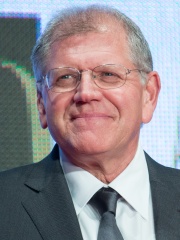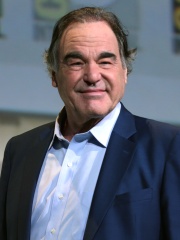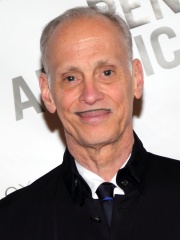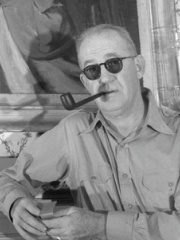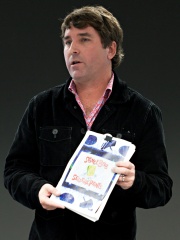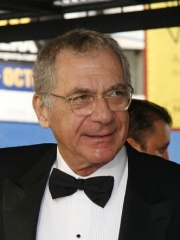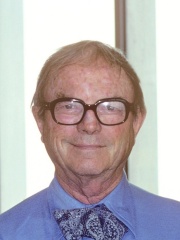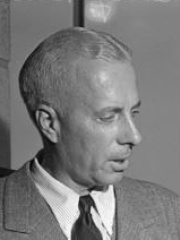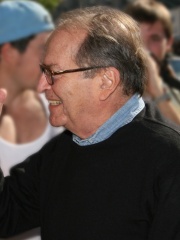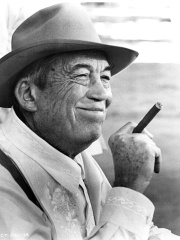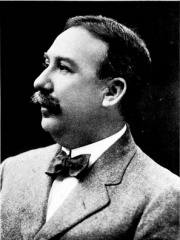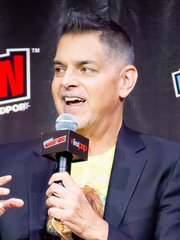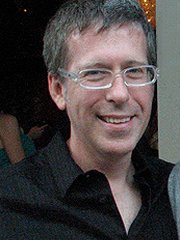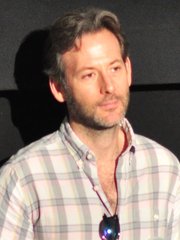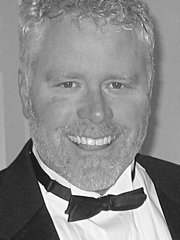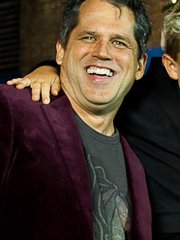

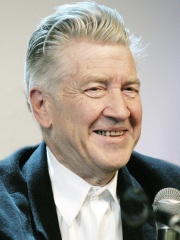
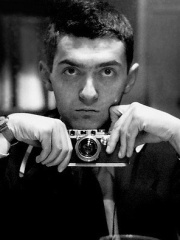
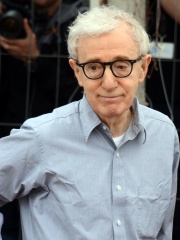
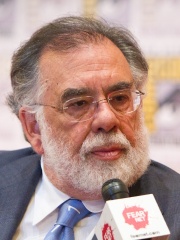
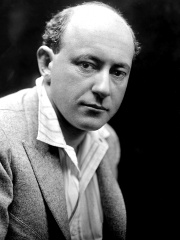
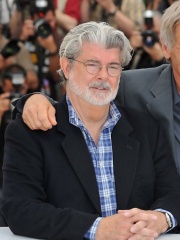
The Most Famous
FILM DIRECTORS from United States
This page contains a list of the greatest American Film Directors. The pantheon dataset contains 2,041 Film Directors, 696 of which were born in United States. This makes United States the birth place of the most number of Film Directors.
Top 10
The following people are considered by Pantheon to be the top 10 most legendary American Film Directors of all time. This list of famous American Film Directors is sorted by HPI (Historical Popularity Index), a metric that aggregates information on a biography's online popularity. Visit the rankings page to view the entire list of American Film Directors.

1. Steven Spielberg (b. 1946)
With an HPI of 87.65, Steven Spielberg is the most famous American Film Director. His biography has been translated into 143 different languages on wikipedia.
Steven Allan Spielberg ( SPEEL-burg; born December 18, 1946) is an American filmmaker. A major figure of the New Hollywood era and pioneer of the modern blockbuster, Spielberg is widely regarded as one of the greatest and most influential filmmakers in the history of cinema and is the highest-grossing film director of all time. Among other accolades, he has received three Academy Awards, four Golden Globe Awards and three BAFTA Awards, as well as the AFI Life Achievement Award in 1995, an honorary knighthood in 2001, the Kennedy Center Honor in 2006, the Cecil B. DeMille Award in 2009, the Presidential Medal of Freedom in 2015, and the National Medal of Arts in 2023. According to Forbes, he is the wealthiest celebrity. Spielberg was born in Cincinnati, Ohio, and grew up in Phoenix, Arizona. He moved to California and studied film in college. After directing several episodes for television, including Night Gallery and Columbo, he directed the television film Duel (1971), which was approved by Barry Diller. He made his theatrical debut with The Sugarland Express (1974), also beginning his decades-long collaboration with composer John Williams, with whom he has worked with for all but five of his theatrical releases. He became a household name with the summer blockbuster Jaws (1975), and continuously directed more acclaimed escapist box-office blockbusters with Close Encounters of the Third Kind (1977), E.T. the Extra-Terrestrial (1982) and the original Indiana Jones trilogy (1981–1989). He also explored drama in The Color Purple (1985) and Empire of the Sun (1987). In 1993, Spielberg directed back-to-back hits with the science fiction thriller Jurassic Park, the highest-grossing film ever at the time, and the epic historical drama Schindler's List, which has often been listed as one of the greatest films ever made. He won the Academy Award for Best Director for the latter as well as for the World War II epic Saving Private Ryan (1998). Spielberg has since directed the science fiction films A.I. Artificial Intelligence (2001), Minority Report (2002), War of the Worlds (2005) and Ready Player One (2018); the historical dramas Amistad (1997), Munich (2005), War Horse (2011), Lincoln (2012), Bridge of Spies (2015) and The Post (2017); the comedies Catch Me If You Can (2002) and The Terminal (2004); the animated film The Adventures of Tintin (2011); the musical West Side Story (2021); and the family drama The Fabelmans (2022). Spielberg co-founded Amblin Entertainment and DreamWorks Pictures, and he has served as a producer for many successful films and television series, among them Poltergeist (1982), Gremlins (1984), Back to the Future (1985), An American Tail (1986), Who Framed Roger Rabbit (1988), Animaniacs (1993), Freakazoid! (1995), Twister (1996), Band of Brothers (2001) and Transformers (2007–present). Several of Spielberg's works are considered among the greatest films in history, and some are among the highest-grossing films ever. Seven of his films have been inducted into the National Film Registry by the Library of Congress as being "culturally, historically or aesthetically significant". In 2013, Time listed him as one of the 100 most influential people, and in 2023, Spielberg was the recipient of the first ever Time 100 Impact Award in the US.

2. Martin Scorsese (b. 1942)
With an HPI of 85.42, Martin Scorsese is the 2nd most famous American Film Director. His biography has been translated into 96 different languages.
Martin Charles Scorsese ( skor-SESS-ee, Italian: [skorˈseːze, -se]; born November 17, 1942) is an American filmmaker. One of the major figures of the New Hollywood era, he has received many accolades, including an Academy Award, four BAFTA Awards, three Emmy Awards, a Grammy Award, and three Golden Globe Awards. He has been honored with the AFI Life Achievement Award in 1997, the Film Society of Lincoln Center tribute in 1998, the Kennedy Center Honor in 2007, the Cecil B. DeMille Award in 2010, and the BAFTA Fellowship in 2012. Four of his films have been inducted into the National Film Registry by the Library of Congress as "culturally, historically or aesthetically significant". Scorsese received a Master of Arts degree from New York University's Steinhardt School of Culture, Education, and Human Development in 1968. His directorial debut, Who's That Knocking at My Door (1967), was accepted into the Chicago Film Festival. In the 1970s and 1980s, Scorsese's films, much influenced by his Italian-American background and upbringing in New York City, centered on macho-posturing men and explore crime, machismo, nihilism and Catholic concepts of guilt and redemption. His trademark styles of extensive use of slow motion and freeze frames, voice-over narration, graphic depictions of extreme violence and liberal use of profanity were first shown in Mean Streets (1973). Scorsese won the Palme d'Or at Cannes with Taxi Driver (1976), which starred Robert De Niro as a disturbed Vietnam veteran. De Niro became associated with Scorsese through eight more films including New York, New York (1977), Raging Bull (1980), The King of Comedy (1982), Goodfellas (1990), Cape Fear (1991), Casino (1995) and The Irishman (2019). In the following decades, he garnered box office success with a series of collaborations with Leonardo DiCaprio, including Gangs of New York (2002), The Aviator (2004), The Departed (2006), Shutter Island (2010), and The Wolf of Wall Street (2013). He worked with both De Niro and DiCaprio on Killers of the Flower Moon (2023). He also directed After Hours (1985), The Color of Money (1986), The Last Temptation of Christ (1988), The Age of Innocence (1993), Kundun (1997), Hugo (2011), and Silence (2016). On television, he has directed episodes for the HBO series Boardwalk Empire (2010–2014) and Vinyl (2016), as well as the HBO documentary Public Speaking (2010) and the Netflix docu-series Pretend It's a City (2021). He has also directed several rock documentaries including The Last Waltz (1978), No Direction Home (2005), and Shine a Light (2008). He has explored film history in the documentaries A Personal Journey with Martin Scorsese Through American Movies (1995) and My Voyage to Italy (1999). An advocate for film preservation and restoration, he has founded three nonprofit organizations: The Film Foundation in 1990, the World Cinema Foundation in 2007 and the African Film Heritage Project in 2017.

3. David Lynch (1946 - 2025)
With an HPI of 82.53, David Lynch is the 3rd most famous American Film Director. His biography has been translated into 85 different languages.
David Keith Lynch (January 20, 1946 – January 16, 2025) was an American filmmaker, painter, visual artist, film editor, musician, and actor. He is widely regarded as one of the greatest and most influential filmmakers in the history of cinema, with his films often characterized by a distinctive surrealist sensibility that gave rise to the adjective "Lynchian". In a career spanning more than five decades, he received numerous accolades, including the Golden Lion for Lifetime Achievement at the Venice Film Festival in 2006, an Academy Honorary Award in 2019, and Laurel Award for Screenwriting Achievement posthumously in 2025. Lynch studied painting and made short films before making his first feature, the independent body horror film Eraserhead (1977), which found success as a midnight movie. He earned critical acclaim and nominations for the Academy Award for Best Director for the biographical drama The Elephant Man (1980) and the neo-noir mystery films Blue Velvet (1986) and Mulholland Drive (2001). For his romantic crime drama Wild at Heart (1990), he received the Palme d'Or at the Cannes Film Festival. He also directed the space opera Dune (1984), the neo-noir horror Lost Highway (1997), the road movie The Straight Story (1999), and the experimental psychological horror film Inland Empire (2006). Lynch and Mark Frost created the ABC surrealist horror-mystery series Twin Peaks (1990–1991; 2017), for which he received nine Primetime Emmy Award nominations. Lynch co-wrote and directed its film prequel, Twin Peaks: Fire Walk with Me (1992). His acting career included roles on Twin Peaks, The Cleveland Show (2010–2013), and Louie (2012), and in the films Lucky (2017) and The Fabelmans (2022). He directed music videos for Chris Isaak, X Japan, Moby, Interpol, Nine Inch Nails, and Donovan, and commercials for Dior, YSL, Gucci, PlayStation 2, and the New York City Department of Sanitation. Lynch also worked as a musician, releasing solo and collaborative albums, and as a furniture designer, cartoonist, animator, photographer, sculptor, and author. A practitioner of Transcendental Meditation, he founded the David Lynch Foundation to fund meditation lessons for at-risk populations. A lifelong smoker, he died from complications of emphysema after being evacuated from his home due to the January 2025 Southern California wildfires.

4. Stanley Kubrick (1928 - 1999)
With an HPI of 81.71, Stanley Kubrick is the 4th most famous American Film Director. His biography has been translated into 131 different languages.
Stanley Kubrick ( KOO-brick; July 26, 1928 – March 7, 1999) was an American filmmaker and photographer. A major figure of the post-war film industry, Kubrick is widely regarded as one of the greatest and most influential filmmakers in the history of cinema. His films were nearly all adaptations of novels or short stories, spanning a number of genres and gaining recognition for their intense attention to detail, innovative cinematography, extensive set design, and dark humor. Born in New York City, Kubrick taught himself film producing and directing after graduating from high school. After working as a photographer for Look magazine in the late 1940s and early 1950s, he began making low-budget short films and made his first major Hollywood film, The Killing, for United Artists in 1956. This was followed by two collaborations with Kirk Douglas: the anti-war film Paths of Glory (1957) and the historical epic film Spartacus (1960). In 1961, Kubrick left the United States and settled in England. In 1978, he made his home at Childwickbury Manor with his wife Christiane, and it became his workplace where he centralized the writing, research, editing, and management of his productions. This permitted him almost complete artistic control over his films, with the rare advantage of financial support from major Hollywood studios. His first productions in England were two films with Peter Sellers: the comedy-drama Lolita (1962) and the Cold War satire Dr. Strangelove (1964). A perfectionist who assumed direct control over most aspects of his filmmaking, Kubrick cultivated an expertise in writing, editing, color grading, promotion, and exhibition. He was famous for the painstaking care taken in researching his films and staging scenes. He frequently asked for several dozen retakes of the same shot in a film, often confusing and frustrating his actors. Despite the notoriety this provoked, many of Kubrick's films broke new cinematic ground and are now considered landmarks. The scientific realism and innovative special effects in his science fiction epic 2001: A Space Odyssey (1968) were a first in cinema history; the film earned him his only Academy Award (for Best Visual Effects) and is regarded as one of the greatest films ever made. While many of Kubrick's films were controversial and initially received mixed reviews upon release—particularly the brutal A Clockwork Orange (1971), which Kubrick withdrew from circulation in the UK following a media frenzy—most were nominated for Academy Awards, Golden Globes, or BAFTA Awards, and underwent critical re-evaluations. For the 18th-century period film Barry Lyndon (1975), Kubrick obtained lenses developed by Carl Zeiss for NASA to film scenes by candlelight. With the horror film The Shining (1980), he became one of the first directors to make use of a Steadicam for stabilized and fluid tracking shots, a technology vital to his Vietnam War film Full Metal Jacket (1987). A few days after hosting a screening for his family and the stars of his final film, the erotic drama Eyes Wide Shut (1999), he died at the age of 70.
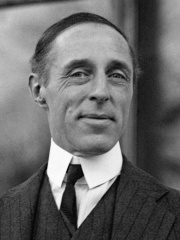
5. D. W. Griffith (1875 - 1948)
With an HPI of 79.78, D. W. Griffith is the 5th most famous American Film Director. His biography has been translated into 73 different languages.
David Wark Griffith (January 22, 1875 – July 23, 1948) was an American film director. Considered one of the most influential figures in the history of the motion picture, he pioneered many aspects of film editing and expanded the art of the narrative film. To modern audiences, Griffith is known primarily for directing the 1915 film The Birth of a Nation. One of the most financially successful films of all time and considered a landmark by film historians, it has been denounced for its degrading portrayals of African Americans, its glorification of the Ku Klux Klan, and support for the Confederacy. The film led to riots in several major cities all over the United States and the NAACP attempted to have it banned. Griffith made his next film Intolerance (1916) as an answer to critics, who he felt unfairly maligned his work. Together with Charlie Chaplin, Mary Pickford, and Douglas Fairbanks, Griffith founded the studio United Artists in 1919 with the goal of enabling actors and directors to make films on their own terms, as opposed to the terms of commercial studios. Several of Griffith's later films were successful, including Broken Blossoms (1919), Way Down East (1920), and Orphans of the Storm (1921), but the high costs he incurred for production and promotion often led to commercial failure. He had made nearly 520 films, including nearly 480 short movies, by the time of The Struggle (1931), his final feature. All but three were completely silent.

6. Woody Allen (b. 1935)
With an HPI of 79.34, Woody Allen is the 6th most famous American Film Director. His biography has been translated into 111 different languages.
Woody Allen (born Allan Stewart Konigsberg; November 30, 1935) is an American filmmaker, actor, writer, and comedian. In a career spanning eight decades, he has written for film, television, and theater, and has published several short stories, a novel, and a memoir. Allen has received many accolades, including the most nominations (16) for the Academy Award for Best Original Screenplay. He has won four Academy Awards, ten BAFTA Awards, two Golden Globe Awards and a Grammy Award, as well as nominations for a Emmy Award and a Tony Award. Allen has also received numerous honors, including an Honorary Golden Lion in 1995, the BAFTA Fellowship in 1997, an Honorary Palme d'Or in 2002, and the Golden Globe Cecil B. DeMille Award in 2014. Two of his films have been inducted into the National Film Registry by the Library of Congress. Allen began his career as part of a team of comedy writers for several Sid Caesar specials, and later wrote numerous humor pieces for The New Yorker as well as several Broadway plays, such as Don't Drink the Water (1966) and Play It Again, Sam (1969). He transitioned to working as a stand-up comedian in Greenwich Village, where he developed a monologue style and the persona of an insecure, intellectual, fretful nebbish. He released three comedy albums, earning a Grammy Award for Best Comedy Album nomination for Woody Allen (1964). Allen also published several books of short stories, such as Getting Even (1971), Without Feathers (1975), and Side Effects (1980). Allen then established himself as prominent director of the New Hollywood era of auteur filmmakers. After writing, directing, and starring in a string of slapstick comedies, such as Take the Money and Run (1969), Bananas (1971), Sleeper (1973), and Love and Death (1975), he directed his seminal work Annie Hall (1977), a romantic comedy-drama featuring Allen and his frequent collaborator Diane Keaton. The film received widespread acclaim and won four Academy Awards: Best Picture, Best Director and Best Original Screenplay, and Best Actress for Keaton. Allen has since directed many films set in New York City, including Manhattan (1979), Hannah and Her Sisters (1986), and Crimes and Misdemeanors (1989). Since becoming a filmmaker, Allen has made one almost every year. They include Interiors (1978), Stardust Memories (1980), Zelig (1983), Broadway Danny Rose (1984), The Purple Rose of Cairo (1985), Radio Days (1987), Husbands and Wives (1992), Bullets Over Broadway (1994), Deconstructing Harry (1997), Match Point (2005), Vicky Cristina Barcelona (2008), Midnight in Paris (2011), and Blue Jasmine (2013). In 2014, he returned to Broadway, adapting his 1994 film into the musical Bullets Over Broadway. He wrote the Amazon Prime Video series Crisis in Six Scenes (2016), and released a memoir, Apropos of Nothing (2020), and a novel, What's With Baum? (2025). From 1980 to 1992, Allen had a professional and personal relationship with actress Mia Farrow. They collaborated on 13 films. The couple separated after he began a relationship in 1991 with Farrow's and Andre Previn's 21-year-old adopted daughter Soon-Yi Previn. In 1992, Farrow publicly accused him of sexually abusing their adopted daughter, Dylan Farrow. The allegation gained substantial media attention, but Allen was never charged with a crime and has denied the allegation. Allen married Previn in 1997 and they have adopted two children.

7. Francis Ford Coppola (b. 1939)
With an HPI of 77.90, Francis Ford Coppola is the 7th most famous American Film Director. His biography has been translated into 90 different languages.
Francis Ford Coppola ( KOH-pə-lə; born April 7, 1939) is an American filmmaker. Considered one of the leading figures of the New Hollywood era as well as one of the pioneers of the gangster film genre, Coppola is widely regarded as one of the greatest and most influential filmmakers in the history of cinema. Coppola is the recipient of five Academy Awards, a BAFTA Award, three Golden Globe Awards, and two Palmes d'Or, in addition to nominations for two Emmy Awards and a Grammy Award. Coppola was honored with the Irving G. Thalberg Memorial Award in 2010, the Kennedy Center Honors in 2024, and the AFI Life Achievement Award in 2025. Coppola started his career directing The Rain People (1969) and co-writing Patton (1970), the latter of which earned him and Edmund H. North the Academy Award for Best Original Screenplay. Coppola's reputation as a filmmaker was cemented with the release of The Godfather (1972) and The Godfather Part II (1974) which both earned Academy Awards for Best Picture, and the latter earned him Best Director. The films revolutionized the gangster genre. Coppola released the thriller The Conversation (1974), which received the Palme d'Or at the Cannes Film Festival. His next film, the Vietnam War epic Apocalypse Now (1979), had a notoriously lengthy and strenuous production and also won the Palme d'Or, making Coppola one of only ten filmmakers to have won the award twice. He later directed films such as The Outsiders and Rumble Fish (both 1983), The Cotton Club (1984), Peggy Sue Got Married (1986), The Godfather Part III (1990), Bram Stoker's Dracula (1992), and The Rainmaker (1997). He also produced American Graffiti (1973), The Black Stallion (1979), and The Secret Garden (1993). Dissatisfied with the studio system, he transitioned to independent and experimental filmmaking with Youth Without Youth (2007), Tetro (2009), Twixt (2011), and Megalopolis (2024). Coppola's father Carmine was a composer whose music featured in his son's films. Many of his relatives have found success in film: his sister Talia Shire is an actress, his daughter Sofia is a director, his son Roman is a screenwriter and his nephews Jason Schwartzman and Nicolas Cage are actors. Coppola resides in Napa, California, and since the 2010s has been a vintner, owning a family-branded winery of his own.

8. Cecil B. DeMille (1881 - 1959)
With an HPI of 77.46, Cecil B. DeMille is the 8th most famous American Film Director. His biography has been translated into 61 different languages.
Cecil Blount DeMille (; August 12, 1881 – January 21, 1959), often known in popular culture as Mr. DeMille, was an American filmmaker and actor. Between 1914 and 1958, he made 70 features, both silent and sound films. He is acknowledged as a founding father of American cinema and the most commercially successful producer-director in film history, with many films dominating the box office three or four at a time. His films were distinguished by their epic scale and by his cinematic showmanship. His silent films included social dramas, comedies, Westerns, farces, morality plays, and historical pageants. Born in Ashfield, Massachusetts and raised in New York City, DeMille began his career as a stage actor in 1900. He later began to write and direct stage plays, a few with his older brother William de Mille, and some with Jesse L. Lasky, who was then a vaudeville producer. DeMille's first film, The Squaw Man (1914), was the first full-length feature film shot in Hollywood. Its interracial love story was commercially successful, and the film marked Hollywood as the new home of the U.S. film industry. Based on continued film successes, DeMille founded Famous Players Lasky which was later reverse merged into Paramount Pictures with Lasky and Adolph Zukor. His first biblical epic, The Ten Commandments (1923), was both a critical and commercial success; it held the Paramount revenue record for 25 years. DeMille directed The King of Kings (1927), a biography of Jesus, which gained approval for its sensitivity and reached more than 800 million viewers. The Sign of the Cross (1932) is said to be the first sound film to integrate all aspects of cinematic technique. Cleopatra (1934) was his first film to be nominated for the Academy Award for Best Picture. After more than 30 years in film production, DeMille reached a pinnacle in his career with Samson and Delilah (1949), a biblical epic that became the highest-grossing film of 1950. Along with biblical and historical narratives, he also directed films oriented toward "neo-naturalism", which focused on portraying the laws of man fighting the forces of nature. DeMille received his first nomination for the Academy Award for Best Director for his circus drama The Greatest Show on Earth (1952), which won both the Academy Award for Best Picture and the Golden Globe Award for Best Motion Picture — Drama. His 1956 remake of The Ten Commandments became his final and best-known film; also a Best Picture Academy Award nominee, it is the eighth-highest-grossing film of all time, adjusted for inflation. In addition to his Best Picture Awards, DeMille received an Academy Honorary Award for his film contributions, the Palme d'Or (posthumously) for Union Pacific (1939), a DGA Award for Lifetime Achievement, and the Irving G. Thalberg Memorial Award. He was the first recipient of the Golden Globe Cecil B. DeMille Award, which was named in his honor. DeMille's reputation had a renaissance in the 2010s, and his work has influenced numerous other films and directors.

9. George Lucas (b. 1944)
With an HPI of 77.35, George Lucas is the 9th most famous American Film Director. His biography has been translated into 110 different languages.
George Walton Lucas Jr. (born May 14, 1944) is an American filmmaker and philanthropist. He created the Star Wars and Indiana Jones franchises and founded Lucasfilm, LucasArts, Industrial Light & Magic and THX. He served as chairman of Lucasfilm before selling it to the Walt Disney Company in 2012. Nominated for four Academy Awards, he is considered to be one of the most significant figures of the 20th-century New Hollywood movement, and a pioneer of the modern blockbuster. Despite this, he has remained an independent filmmaker for most of his career. After graduating from the University of Southern California in 1967, Lucas moved to San Francisco and co-founded American Zoetrope with filmmaker Francis Ford Coppola. He wrote and directed THX 1138 (1971), based on his student short Electronic Labyrinth: THX 1138 4EB, which was a critical success but a financial failure. His next work as a writer-director was American Graffiti (1973), inspired by his youth in early 1960s Modesto, California, and produced through the newly founded Lucasfilm. The film was critically and commercially successful and received five Academy Award nominations, including Best Director and Best Picture. Lucas's next film, the epic space opera Star Wars (1977), later retitled A New Hope, had a troubled production but was a surprise hit, becoming the highest-grossing film at the time, winning six Academy Awards and sparking a cultural phenomenon. Lucas produced and co-wrote the sequels The Empire Strikes Back (1980) and Return of the Jedi (1983). With director Steven Spielberg, he created, produced, and co-wrote Indiana Jones films Raiders of the Lost Ark (1981), The Temple of Doom (1984), The Last Crusade (1989) and The Kingdom of the Crystal Skull (2008), and served as an executive producer, with a cursory involvement in pre and post-production, on The Dial of Destiny (2023). In 1997, Lucas re-released the original Star Wars trilogy as part of a Special Edition featuring several modifications; home media versions with further changes were released in 2004 and 2011. He returned to directing with a Star Wars prequel trilogy comprising The Phantom Menace (1999), Attack of the Clones (2002) and Revenge of the Sith (2005). He last collaborated on the CGI-animated movie and television series of the same name, Star Wars: The Clone Wars (2008–2014, 2020), the war film Red Tails (2012) and the jukebox musical fantasy CGI-animated film Strange Magic (2015). Lucas is also known for his collaboration with composer John Williams, who was recommended to him by Spielberg, and with whom he has worked for all the films in both of these franchises. He also produced and wrote a variety of films and television series through Lucasfilm between the 1970s and the 2010s. Lucas is one of history's most financially successful filmmakers. He directed or wrote the story for ten of the 100 highest-grossing movies at the North American box office, adjusted for ticket-price inflation. Through his companies Industrial Light and Magic and Skywalker Sound, Lucas was involved in the production of, and financially benefited from, almost every big-budget film released in the U.S. from the late 1980s until selling to Disney in 2012. In addition to his career as a filmmaker, Lucas has founded and supported multiple philanthropic organizations and campaigns dedicated to education and the arts, including the George Lucas Educational Foundation, which has been noted as a key supporter in the creation of the federal E-Rate program to provide broadband funding to schools and libraries, and the Lucas Museum of Narrative Art, a forthcoming art museum in Los Angeles developed with his wife, Mellody Hobson.
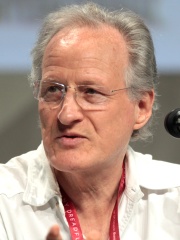
10. Michael Mann (b. 1943)
With an HPI of 75.77, Michael Mann is the 10th most famous American Film Director. His biography has been translated into 47 different languages.
Michael Kenneth Mann (born February 5, 1943) is an American film director, screenwriter, author and producer. Best known for his stylized crime dramas, he has won two Primetime Emmy Awards, as well as earned nominations for four Academy Awards, two Golden Globe Awards, and a BAFTA Award. His most acclaimed works include the films Thief (1981), Manhunter (1986), The Last of the Mohicans (1992), Heat (1995), The Insider (1999), Ali (2001), Collateral (2004), Public Enemies (2009), and Ferrari (2023). He was executive producer on the popular TV series Miami Vice (1984–90), which he adapted into a 2006 feature film.
People
Pantheon has 697 people classified as American film directors born between 1854 and 2000. Of these 697, 446 (63.99%) of them are still alive today. The most famous living American film directors include Steven Spielberg, Martin Scorsese, and Woody Allen. The most famous deceased American film directors include David Lynch, Stanley Kubrick, and D. W. Griffith. As of April 2024, 64 new American film directors have been added to Pantheon including Jonathan Mostow, Don Mancini, and Kevin Greutert.
Living American Film Directors
Go to all RankingsSteven Spielberg
1946 - Present
HPI: 87.65
Martin Scorsese
1942 - Present
HPI: 85.42
Woody Allen
1935 - Present
HPI: 79.34
Francis Ford Coppola
1939 - Present
HPI: 77.90
George Lucas
1944 - Present
HPI: 77.35
Michael Mann
1943 - Present
HPI: 75.77
Quentin Tarantino
1963 - Present
HPI: 75.35
Tim Burton
1958 - Present
HPI: 74.69
Robert Zemeckis
1952 - Present
HPI: 74.20
Oliver Stone
1946 - Present
HPI: 74.09
Brian De Palma
1940 - Present
HPI: 73.12
John Waters
1946 - Present
HPI: 72.23
Deceased American Film Directors
Go to all RankingsDavid Lynch
1946 - 2025
HPI: 82.53
Stanley Kubrick
1928 - 1999
HPI: 81.71
D. W. Griffith
1875 - 1948
HPI: 79.78
Cecil B. DeMille
1881 - 1959
HPI: 77.46
John Ford
1894 - 1973
HPI: 74.91
Stephen Hillenburg
1961 - 2018
HPI: 73.55
Sydney Pollack
1934 - 2008
HPI: 72.70
Chuck Jones
1912 - 2002
HPI: 72.44
Howard Hawks
1896 - 1977
HPI: 71.46
Sidney Lumet
1924 - 2011
HPI: 70.73
John Huston
1906 - 1987
HPI: 70.64
Edwin S. Porter
1870 - 1941
HPI: 70.60
Newly Added American Film Directors (2025)
Go to all RankingsJonathan Mostow
1961 - Present
HPI: 51.18
Don Mancini
1963 - Present
HPI: 48.90
Kevin Greutert
1965 - Present
HPI: 47.92
Jeff Baena
1977 - 2025
HPI: 45.88
Ric Roman Waugh
1968 - Present
HPI: 45.40
Vicky Jenson
1960 - Present
HPI: 45.35
Sean McNamara
1962 - Present
HPI: 45.15
Audrey Wells
1960 - 2018
HPI: 44.85
Boaz Yakin
1965 - Present
HPI: 44.78
Chris Roberts
1968 - Present
HPI: 43.84
Jeff Tremaine
1966 - Present
HPI: 43.74
Scott Waugh
1970 - Present
HPI: 43.73
Overlapping Lives
Which Film Directors were alive at the same time? This visualization shows the lifespans of the 25 most globally memorable Film Directors since 1700.



